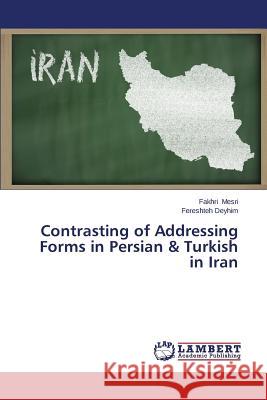Contrasting of Addressing Forms in Persian & Turkish in Iran » książka
Contrasting of Addressing Forms in Persian & Turkish in Iran
ISBN-13: 9783659617539 / Angielski / Miękka / 2014 / 112 str.
Contrasting of Addressing Forms in Persian & Turkish in Iran. Fakhri Mesri: Payam-e-Noor University, Po Box 19395-3697, Tehran, I.R of IRAN. All human languages have addressing forms. Addressing forms are considered as an interesting phenomenon in the study on the across cultural communication because of including numerous addressing systems in different cultures and languages . This study focuses on the social- pragmatics aspects of form of address and terms of reference in Turkish and Persian in Iranian context. The aim of the study is to explore the choice of such terms in different situations by different people and also it gives opportunity to explore the influence of factors like relative powers and social distance on the use of forms of address on reference in the highly stratified society. Eighty people participating in the present study .Frothy group was Turkish and frothy group was Persian. In both of the groups were male, female, modern, and traditional subjects. They had t o complete the questioners which were about addressing form in different context. The result of this study shows that the terms which are used by different people are not always the same.
Contrasting of Addressing Forms in Persian & Turkish in Iran. Fakhri Mesri: Payam-e-Noor University, Po Box 19395-3697, Tehran, I.R of IRAN. All human languages have addressing forms. Addressing forms are considered as an interesting phenomenon in the study on the across cultural communication because of including numerous addressing systems in different cultures and languages . This study focuses on the social- pragmatics aspects of form of address and terms of reference in Turkish and Persian in Iranian context. The aim of the study is to explore the choice of such terms in different situations by different people and also it gives opportunity to explore the influence of factors like relative powers and social distance on the use of forms of address on reference in the highly stratified society. Eighty people participating in the present study .Frothy group was Turkish and frothy group was Persian. In both of the groups were male, female, modern, and traditional subjects. They had t o complete the questioners which were about addressing form in different context. The result of this study shows that the terms which are used by different people are not always the same.











